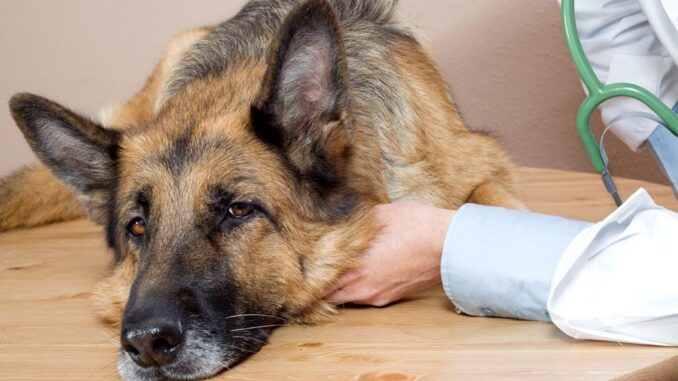
This article was updated on January 14th, 2024

There’s never a great time for your dog to have diarrhea. But when they start having it at nighttime, it presents its own set of special challenges. If you get woken up by a messy bout of diarrhea from your dog in the middle of the night, know that you are not alone. In this article, our veterinarians explain when it’s a big deal, and also provide tips to help stop your dog’s diarrhea.
Key Highlights
– Nighttime diarrhea is normal for the most part. It can be caused by a change in diet, meal times, or a new medication.
– More serious causes include allergies, an infection, or a disease.
– See a vet if diarrhea lasts more than 2 nights or your dog is showing worsening symptoms.
– A new feeding schedule, probiotics, and a bland diet can help milder cases.
5 things to know when your dog has nighttime diarrhea:
1. Occasional diarrhea is normal, but call a vet if it lasts longer than two nights
“Occasional diarrhea is completely normal in dogs. It is just the body’s way of getting rid of something irritating. Having diarrhea that lasts a night or two with no other signs usually isn’t a cause for concern.
You should worry when it lasts longer than two nights or if your dog is showing other signs of illness. For example, if they are vomiting, lethargic, not eating, or having stomach pain.”

2. Nighttime diarrhea could be due to the timing of meals
Dogs are more likely to have accidents at night since they usually aren’t allowed the freedom to go outdoors as frequently at night as they are at any other time.
“Diarrhea at night may also be more common due to the timing of their meals or medications. Dogs usually take 6-10 hours to digest a meal, meaning if your dog ate something they shouldn’t have during the day, the problems are more likely to come out at night.”
3. Top causes of nighttime diarrhea include food issues, an illness or a new medication
Still not sure what’s going on with your pup? Here are the top causes:
1. They ate something they shouldn’t have
Some dogs will eat anything and everything that will fit in their mouth, even things that may upset their digestive tract. Eating trash, rotten food, toxic plants, dirt, rocks, or table scraps can all throw a dog’s gut into turmoil.
Those dogs that have more of an iron gut may only show up with diarrhea, while others may experience vomiting, lethargy, not wanting to eat, and stomach pain.
2. A change in diet could upset your dog’s microbiome
A dog’s digestive system contains a finely tuned microbiome that is there to efficiently digest their normal diet. Any changes in that diet, even just a switch in brand or flavor, can disrupt that important microbiome and leave a dog with a case of diarrhea. Vomiting may also be a part of it.
Veterinarian Tip: When changing a dog’s food, always gradually mix the new food into the old over a week or longer.
3. Your dog picked up an illness
Bacteria, viruses, and parasites are everywhere in your dog’s world, making it easy for him to pick up a diarrhea-causing culprit from contact with other dogs, feces, or contaminated water.
This is more common in puppies, older dogs, or those with other health issues. Healthy dogs can better fight these infections before they cause a problem. Vomiting, lethargy, not eating, fever, stomach pain, and blood in stool are all indications that your dog may have picked up an illness.
4. Your dog’s new medication is causing temporary diarrhea
Medications, such as dewormers or antibiotics, can cause temporary diarrhea. You may notice it more at night due to the timing of when you gave the medication. Most of the time, you won’t notice any other signs, and it will go away within a couple of nights.
5. Food allergies and diseases
Dogs may develop allergies to certain types of food, mainly a protein source like chicken, beef, or egg. Diarrhea, along with vomiting, gas, and stomach pain may result.
Pancreatitis, inflammatory bowel disease (IBD), and stress may also contribute to diarrhea at night. With these diseases, you will likely notice other symptoms. For example, you may notice vomiting and stomach pain with IBD and pancreatitis, or increased panting, hiding, or anxiety with stress-related causes.
4. Home remedies to help avoid the nighttime mess
“If one of my dogs had more than one episode of diarrhea at night (with no other signs of illness), I would give probiotics for a couple of days and adjust their feeding schedule. If the diarrhea continues and they are still eating, I start feeding a bland diet of chicken and rice in small amounts 3-4 times a day. If the diarrhea lasts 3 days or nights or if their signs get more severe, it’s time for a workup.”

If you’re noticing that your dog has diarrhea at night, it may be time to get to the bottom of it. Here are our veterinarian’s top tips on how to address the issue at home.
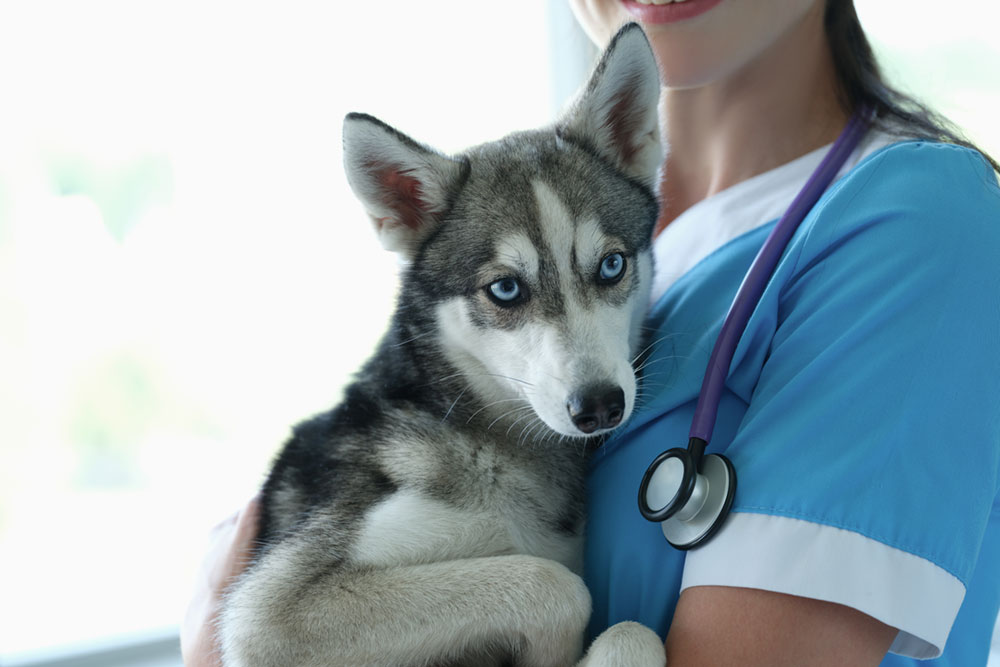
1. Adjust their feeding schedule
If your dog seems otherwise healthy, you may adjust their feeding schedule. Most of the time, you can figure out a dog’s digestive transit time and either feed them earlier in the morning to make sure that breakfast meals move through before nighttime or wait to feed until later in the evening so that it will be morning by the time your dog is ready to go.
If your pup is showing other signs along with diarrhea and you haven’t recently changed their diet or started a new medication, here are some other options:
2. Try feeding them a bland diet
Sometimes the gut just needs a break. Feeding an easily digestible, bland diet is a way to give your dog nutrition without putting a lot of strain on the digestive system. Boiled chicken and rice for 2-3 days with a gradual return to their regular diet can help clear up mild cases of diarrhea.
3. Give your dog some help with probiotics
The microbiome is made up of bacteria that lead to a healthy digestive system. When things get out of whack, repopulating that microbiome with probiotics can help right the digestive ship and help mild diarrhea.
4. Add some fiber
Fiber is an important part of a dog’s diet. It helps to regulate the digestive time and bulk up watery bowel movements. You can up your dog’s fiber by giving low-calorie dog foods, feeding a little canned pumpkin, or other approved fiber supplements.
5. Feed smaller portions
You also may opt to give your dog smaller meals more frequently. This will just help prevent the gut from being overloaded with a large meal and may keep dogs satiated for longer to reduce stress.
Veterinarian note: If your pup has diarrhea that lasts more than a couple of nights or if he is showing any other signs, it’s time to call your vet. Home remedies won’t fix all issues.
5. Call the vet when your dog is showing worrying symptoms or when diarrhea lasts more than two nights
Depending on the cause of your dog’s nighttime diarrhea, you may need to get a veterinarian involved.
For changes in food or eating something that they shouldn’t have, diarrhea should only last a night or two. Most of the time, with these mild cases, a dog will still be eating and may vomit once or twice but not have any other really serious symptoms.
On the other hand, if diarrhea lasts longer than a couple of nights or if he’s also not eating, vomiting frequently is lethargic, has a fever, or stomach pain, it’s time to see your vet. You may also consider getting your vet involved if your dog has recurrent cases of nighttime diarrhea that come and go with or without other symptoms.
Emergency situations would include when your dog is dehydrated due to diarrhea or vomiting or if he is in severe discomfort. Read our article: when is diarrhea an emergency?
How your vet will help your dog with nighttime diarrhea
Your veterinarian will want to get to the bottom of your dog’s diarrhea at night. This will depend on the examination and history of your pup’s issues.
“If your dog’s bowel movement issue is related to dietary changes or eating something bad, they will focus on getting him on a suitable diet, which may include prescription food. They may also prescribe anti-vomiting medications, give fluids, or take x-rays to check for foreign objects. If your dog has an infection, they may need fluids, antibiotics, anti-vomiting medications, and anti-inflammatories, along with a special diet.”

If possible, bringing a fecal sample may aid in your dog’s diagnosis. The vet will be able to check for parasites and digestive abnormalities that could be the culprit. The fresher the sample, the better, so be sure to get the most recent.
Look to spend anywhere from $200 for mild cases of nighttime diarrhea to $1,000 or more for cases that require hospitalization.
The prognosis for nighttime diarrhea in dogs is good for mild cases and good to guarded depending on the cause for more severe cases. Having your dog up-to-date on their vaccinations, providing a high-quality diet, and not feeding table scraps can all help prevent diarrhea at night from recurring.
FAQ
Can the causes of nighttime diarrhea be different for puppies, adults, and senior dogs?
Puppies are more likely to eat things that they shouldn’t, just due to their curious nature and propensity to chew. Puppies are also highly susceptible to infections since their immune systems are still developing. Senior dogs are also more susceptible to infections due to a decline in immune function with age and other underlying health conditions. Senior dogs may also be more likely to have stress-related diarrhea because their cognitive health is declining, and they are less accepting of change.
What if my dog has diarrhea at night, but everything else seems normal?
Check your dog’s diet if they aren’t showing any other signs besides nighttime diarrhea. If you have recently changed food without gradually transitioning him or have started a new medication, that is the most likely culprit. If your pup likes to inhale everything in his environment, that may be another likely cause.
What if my dog is also vomiting?
Vomiting and diarrhea at the same time often indicate that something is wrong with the digestive tract. This could be anything from eating something he shouldn’t have to a change in diet to an illness. If a dog isn’t showing lethargy and is still eating normally, monitoring for a day or two is usually fine. However, if he is showing any other signs, he should be seen by a vet.
For more ideas on how to stop dog diarrhea at night, check out these 8 Easy Tips from a Vet.
Related articles:
Disclaimer: This website's content is not a substitute for veterinary care. Always consult with your veterinarian for healthcare decisions. Read More.


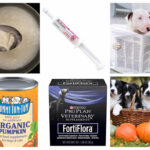







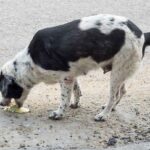

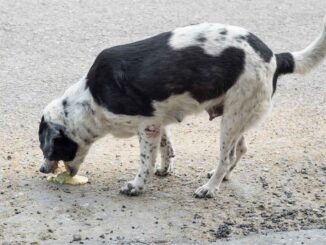

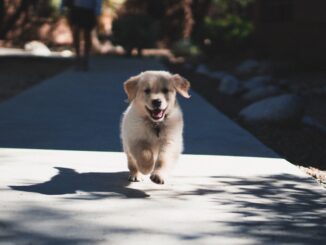
Be the first to comment